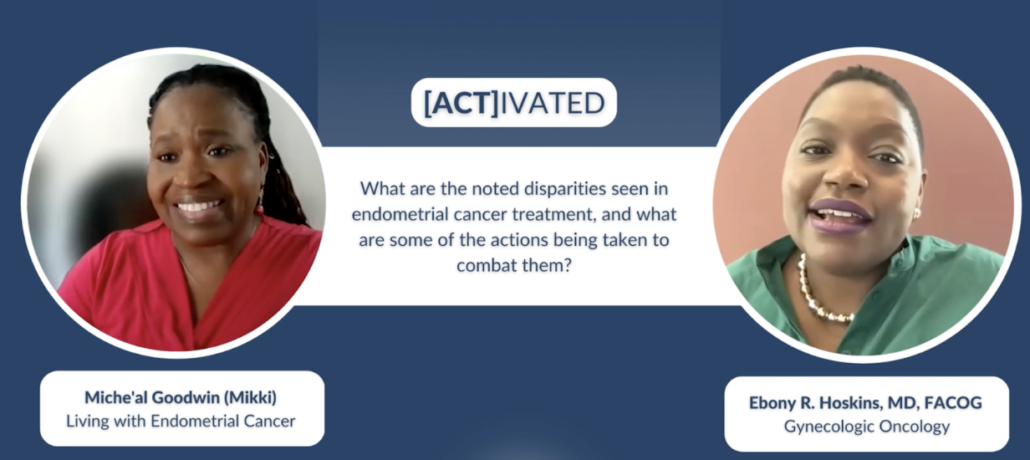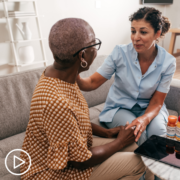Patient Empowerment Network (PEN) is committed to helping educate and empower patients and care partners in the endometrial cancer community. Endometrial cancer treatment options are ever-expanding with new treatments, and it’s important for patients and families to educate themselves about testing, factors in treatment decisions, treatment types, and disparities in care. With this goal in mind, we kicked off the [ACT]IVATED Endometrial Cancer program, which aims to inform, empower, and engage patients to stay abreast of the latest in endometrial cancer care.
Endometrial cancer is a cancer of the lining of the uterus where menstruation occurs. Abnormal bleeding is a common symptom of endometrial cancer. PEN is proud to add information about endometrial cancer to serve more patients and their families.
Endometrial cancer survivor Mikki Goodwin interviewed expert Dr. Ebony Hoskins, a board-certified gynecologic oncologist at MedStar Washington Hospital Center and Assistant Professor of Clinical Obstetrics and Gynecology at Georgetown University Medical Center. Mikki was initially diagnosed as stage III and progressed to stage IVB after a complete hysterectomy. Her treatment journey included a robotic hysterectomy, six rounds of chemotherapy, and 26 rounds of radiation.
Factors in Endometrial Cancer Treatment Options
Endometrial cancer care can have different options depending on the stage and other factors. Stage IV endometrial cancer survivor Mikki Goodwin spoke with expert Dr. Ebony Hoskins from MedStar Washington Hospital Center. Dr. Hoskins explained some of the factors that play into treatment decisions. “I think we follow kind of certain guidelines, if you will and providing standard of care and the first frontline therapy is pretty standard, right? In terms of advanced treatment, when patients recur and we have to look at alternate treatment therapies, I always look at the patient, I always look at what their medical problems are or any side effects. And, of course, the data to see how well are they going to do, what side effects and quality of life? There are numerous factors that are not just something looking in a book and say, ‘Okay, I’ll take A,’ right? Like I think we have to look at all of that and make a decision with our patients over undergoing the side effects, the efficacy, all of these things that are in mind when we talk to patients.”

Endometrial Cancer Disparities
Dr. Ebony Hoskins shared about endometrial cancer disparities. “…we know that Black women are diagnosed pretty much at the same rate as white women, but have a two times higher risk of death. And so that alone is a big disparity. We also see…more aggressive tumor types in Black women…I think some of the clinical trials have recognized that there is a low number of patients in these trials advancing, and so there has been an increased effort in recruiting patients into these
trials. I think there is more work being done, to understand the biology and why there’s a difference. Me as a provider I will always think, ‘Oh, it’s because women went to the doctor late or access to care.’ And then I’m like, ‘Well, no, no, no these women have access to care. They have access to insurance. They went to the doctor right away.’ And so I think it’s very complex and deserves more study into it.”
Dr. Hoskins further explained about the importance of diversity in clinical trials. “…I think clinical trial participation is important in endometrial cancer. Number one, the rate of Black women getting advanced and aggressive endometrial cancer is on the rise. The representation in these trials are different. What’s different is not only the patient, the tumor type is different. How do we know that these same patients that’s not in the trials are going to respond to this treatment? That’s what I always ask…maybe they don’t respond as well, because that’s a different disease type, right?”
Marginalized patient groups are another area of concern for endometrial cancer patients, and Dr. Hoskins explained some of these patient groups. “…I think we could say minority populations, we can say Black women, we can say Hispanic women, and…marginalized, patients who don’t have access to care. Yes. I definitely think that you could or they could have a worse outcome, whether it’s for lack of access for someone who may not be insured or for patients who may be in this country without proper documentation getting the medical care that they may need…we’ve talked about race as being a risk factor, and again, access to care is certainly a risk factor…So disadvantaged populations could be patients who live in rural areas, patients with gender identity changes.”
Solutions Toward Better Endometrial Cancer Care
Clinical trial participation is vital to develop effective endometrial cancer treatment for all patients. Dr. Hoskins had a recent interaction with an endometrial cancer patient and shared about her interaction.
“I recently had a patient that I referred to a clinical trial. And she really was struggling with whether she should do it or not. And one of the things that I said to her is, ‘I think it’s important. One, you’re going to have access to advanced treatment options that are not there now. And Black women are dying, and we need this information to know if this is the same.’ And she instantly was like, ‘I’m going, I’m doing it.’ And I think it’s very important that we have patients with access to trials.”
Dr. Hoskins also shared her perspective about patients advocating for their best care. “…it’s okay to find a different provider, or a doctor to make sure that you’re heard.…seek alternate care or another opinion. I think it’s very important that patients have a doctor that they trust and feel like they can ask questions for…I really don’t think it’s okay to be dismissed.”
Cancer survivor Mikki Goodwin has been involved with the Endometrial Cancer Action Network for African-Americans (ECANA), which has served as a partner for the [ACT]IVATED Endometrial Cancer program. Mikki shared her patient experience and the importance of empowering yourself as a patient. “Live on purpose every day, be your best advocate, record doctor appointments, you’ll never remember everything, so it’s good to be able to play it back, take one day at a time, rest when you need to rest that is part of healing, and stay hydrated. Having cancer is not a sentence to die, but a call to live intentionally. More than anything, stay positive, more than half the battle starts in the mind.”

[ACT]IVATED Endometrial Cancer Program Resources
The [ACT]IVATED Endometrial Cancer program series takes a three-part approach to inform, empower, and engage both the overall endometrial cancer community and endometrial cancer patient groups who experience health disparities. The series includes the following resources:
Though there are endometrial cancer disparities, patients and care partners can be proactive in educating themselves to help ensure optimal care. We hope you can take advantage of these valuable resources to aid in your endometrial cancer care for yourself or for your loved one.
[ACT]IVATION Tip:
By texting EMPOWER to +1-833-213-6657, you can receive personalized support from PENs Empowerment Leads. Whether you’re a endometrial cancer patient, or caring for someone who is living with it, PEN’s Empowerment Leads will be here for you at every step of your journey. Learn more.























